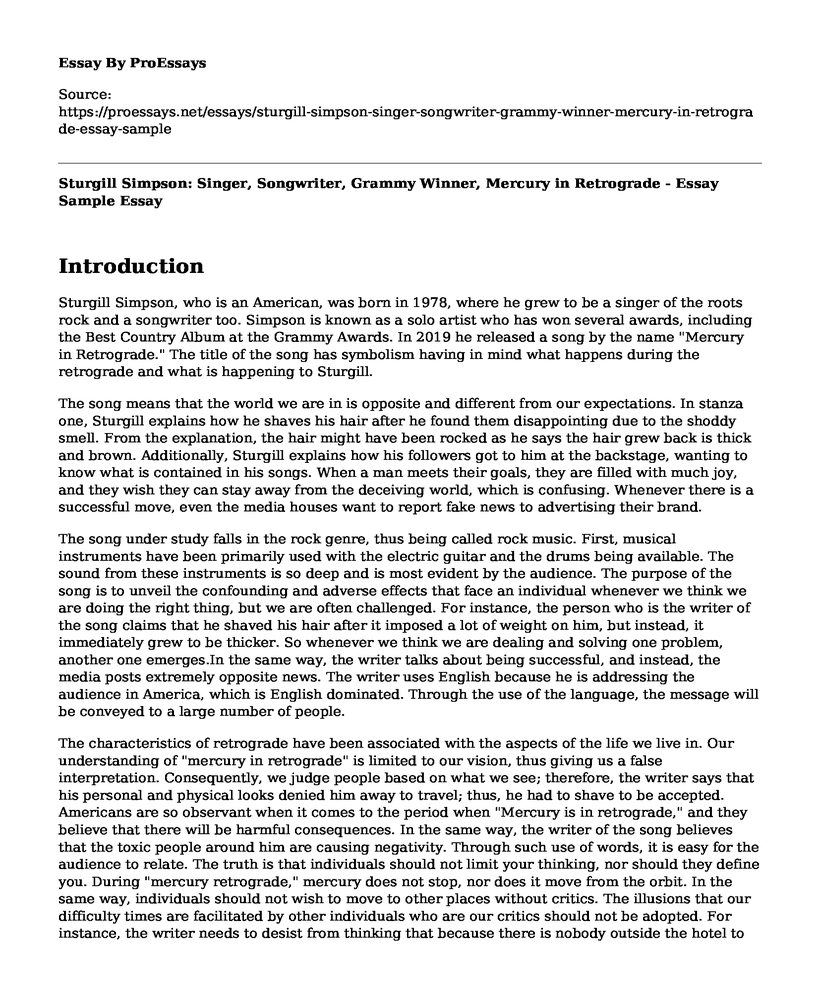Introduction
Sturgill Simpson, who is an American, was born in 1978, where he grew to be a singer of the roots rock and a songwriter too. Simpson is known as a solo artist who has won several awards, including the Best Country Album at the Grammy Awards. In 2019 he released a song by the name "Mercury in Retrograde." The title of the song has symbolism having in mind what happens during the retrograde and what is happening to Sturgill.
The song means that the world we are in is opposite and different from our expectations. In stanza one, Sturgill explains how he shaves his hair after he found them disappointing due to the shoddy smell. From the explanation, the hair might have been rocked as he says the hair grew back is thick and brown. Additionally, Sturgill explains how his followers got to him at the backstage, wanting to know what is contained in his songs. When a man meets their goals, they are filled with much joy, and they wish they can stay away from the deceiving world, which is confusing. Whenever there is a successful move, even the media houses want to report fake news to advertising their brand.
The song under study falls in the rock genre, thus being called rock music. First, musical instruments have been primarily used with the electric guitar and the drums being available. The sound from these instruments is so deep and is most evident by the audience. The purpose of the song is to unveil the confounding and adverse effects that face an individual whenever we think we are doing the right thing, but we are often challenged. For instance, the person who is the writer of the song claims that he shaved his hair after it imposed a lot of weight on him, but instead, it immediately grew to be thicker. So whenever we think we are dealing and solving one problem, another one emerges.In the same way, the writer talks about being successful, and instead, the media posts extremely opposite news. The writer uses English because he is addressing the audience in America, which is English dominated. Through the use of the language, the message will be conveyed to a large number of people.
The characteristics of retrograde have been associated with the aspects of the life we live in. Our understanding of "mercury in retrograde" is limited to our vision, thus giving us a false interpretation. Consequently, we judge people based on what we see; therefore, the writer says that his personal and physical looks denied him away to travel; thus, he had to shave to be accepted. Americans are so observant when it comes to the period when "Mercury is in retrograde," and they believe that there will be harmful consequences. In the same way, the writer of the song believes that the toxic people around him are causing negativity. Through such use of words, it is easy for the audience to relate. The truth is that individuals should not limit your thinking, nor should they define you. During "mercury retrograde," mercury does not stop, nor does it move from the orbit. In the same way, individuals should not wish to move to other places without critics. The illusions that our difficulty times are facilitated by other individuals who are our critics should not be adopted. For instance, the writer needs to desist from thinking that because there is nobody outside the hotel to appreciate him, maybe, then it turns out to be a boring day.
Cite this page
Sturgill Simpson: Singer, Songwriter, Grammy Winner, Mercury in Retrograde - Essay Sample. (2023, Apr 24). Retrieved from https://proessays.net/essays/sturgill-simpson-singer-songwriter-grammy-winner-mercury-in-retrograde-essay-sample
If you are the original author of this essay and no longer wish to have it published on the ProEssays website, please click below to request its removal:
- Essay on Thomas Morley as the Father of the English Madrigal
- The Single Draft or the Multiple Draft Method of Writing? Argumentative Essay
- Essay Sample on Academic Plan and Life Goals
- The Big Bang Theory - Television Show Analysis Essay
- Essay Sample on Aliens on Earth: UFOs in American Newspapers
- Essay on MTV: Music, Controversy, and a Legacy of Youth Networking.
- Essay Sample on The Power of Music: Enhancing Brain Development







